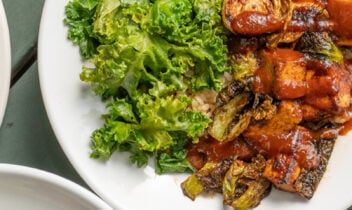
Eggs and Produce: A Deliciously Dynamic Duo
The month of May celebrates both National Egg Month and National Salad Month, two of my favorite foods! There are so many ways to combine eggs and produce to create a powerful partnership of nutrition, health and flavor. Let’s take a closer look.
Nutrition Stars
With just 70 calories, one large egg comes packaged with the highest quality protein and 12 essential vitamins, minerals and phytonutrients: vitamins A, B6, B12, D, E riboflavin and folic acid; minerals choline, iron, zinc, selenium and phosphorus plus antioxidants lutein and zeaxanthin. Fruits and vegetables are low in calories and fat yet nutrition-packed, boasting an assortment of key nutrients including fiber; vitamins A, C and folic acid; the minerals potassium and magnesium as well as phytonutrients lutein, zeaxanthin, lycopene, flavonols and carotenes.
Health Heroes
The array of nutrients in eggs, fruits and veggies deliver a variety of benefits. While each is remarkable on its own, together their synergy makes them powerful partners in promoting health and reducing disease risk. In fact, one study found that topping a salad with an egg resulted in seven times greater absorption of vitamin E from the vegetables in the salad!
Both eggs and produce supply vitamin A, folic acid, lutein and zeaxanthin.
- Folic acid is necessary for red blood cells and critically important during pregnancy to prevent birth defects in the infant’s brain and spine.
- Vitamin A keeps eyes and skin healthy and helps to protect against infections.
- Lutein and zeaxanthin work together to decrease the risk of macular degeneration and other age-related eye diseases, which can lead to blindness. Lutein also plays a role in brain health and function throughout life.
Choline in eggs is also important in brain development during pregnancy and infancy, particularly related to memory and learning.
The protein in eggs and fiber in produce both help with weight management by creating a feeling of fullness after eating in addition to their lower calorie and fat content.
Fiber in fruits in vegetables has additional benefits in helping lower blood cholesterol, which may decrease heart disease and stroke risk; aiding in proper gut function to reduce constipation and diverticulosis and protecting against colon cancer.
Protein provided by eggs is also essential for muscle growth, repair and maintenance throughout life and especially for growing kids and teens, pregnant women, athletes and the elderly.
Vitamin C in produce helps heal cuts and wounds, keeps teeth and gums healthy and aids in iron absorption.
Potassium in fruits and veggies helps maintain a regular heartbeat, normal blood pressure and muscles function as well as lowering the risk of stroke.
Also, eating plenty of vegetables and fruits as part of a healthy diet may protect against certain types of cancers in part due to their vitamin C, vitamin A, folic acid, fiber and flavonol content.
Finally, studies have linked daily egg intake to reduced risk of stroke as well as favorable changes in HDL (“good”) cholesterol, insulin sensitivity and blood sugar for improved control of type 2 diabetes and pre-diabetes.
Fabulous Flavors
Eggs, fruits and veggies are each delicious by themselves but they’re even better together. Eggs aren’t just for breakfast and vegetables aren’t just for dinner anymore. Consider pairing eggs, fruits and vegetables in creative ways. For instance, scramble eggs with veggies at breakfast, layer hard-cooked eggs on a salad or over-easy eggs on a sandwich with lettuce, tomato and bell pepper at lunch and create savory dinner entrees from curry to hash by combining eggs and produce. Here are just a few ideas.
Corn and Zucchini Pan Omelette
Pear Spinach and Egg Flatbread
Avocado & Potato Hash with Sunny Side Eggs


